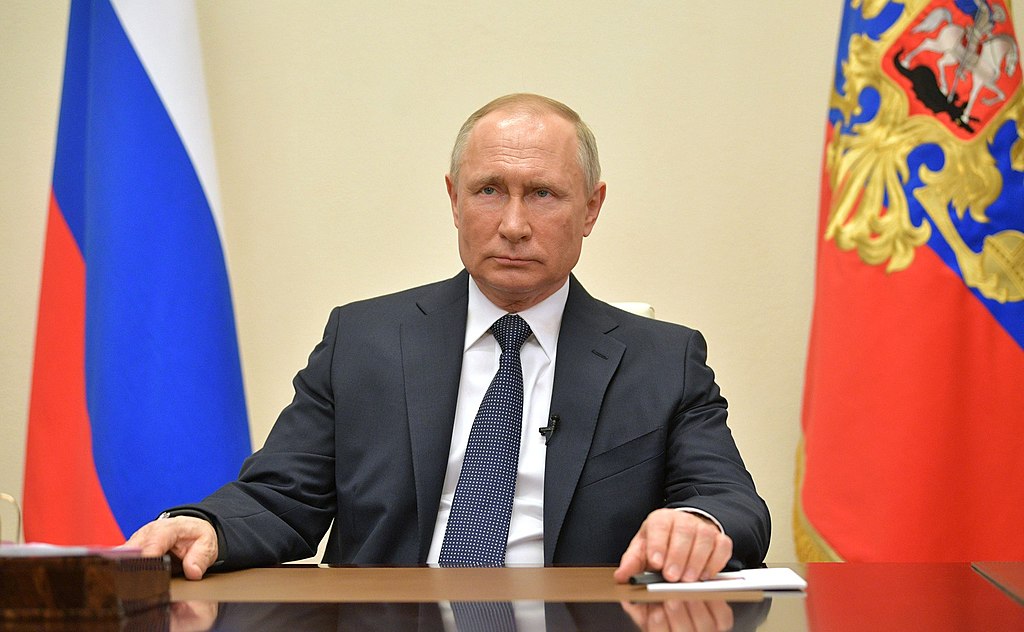In the popular tradition of the sea, a captain is required to stay on a sinking ship until all the passengers have been safely evacuated. In Russia, where the economy is sinking due to the collapse of oil prices and the coronavirus crisis, President Vladimir Putin is nowhere to be seen.
The Russian leader self-isolated early in the outbreak after coming into contact with a Moscow doctor who later tested positive for COVID-19. Ever since, he rarely appears on television, which is quite unusual for a man who built his reputation though series of PR moves. In the past he was seen riding a bear, saving people from wild Siberian tigers, taking a flight in fighter jets, riding a motorcycle, taking a dive in submarines and showing off his black belt judo skills. The Russian audience got used to Putin’s presence in the media, but during the COVID-19 pandemic he has been strangely absent. There was speculation that he was hiding in a bunker but, according to his spokesman Dmitry Peskov, the Russian President is in his Novo-Ogaryovo residence outside Moscow.
Putin usually avoids coming out with bad news and, since there is hardly any good news in Russia at the moment, it is no surprise that he is absent from public life. Recently, hundreds of people protested against regional authorities in southern Russia over what they said were restrictive and unnecessary coronavirus measures as the lockdown in the Russian Federation, as in many other countries, has caused much suffering and is already having severe consequences on the economy. Reportedly, anger over job losses and a lack of clear information saw 2,000 people protest in the southern city of Vladikavkaz on April 20, resulting in riot police violently dispersing the crowd and detaining dozens of people, according to local media. Gas workers in Russia’s Far East also staged a mass rally to demand better working conditions and more transparency amid a reported coronavirus outbreak at their gas field in Yakutia. Also, the leader of the Kremlin-friendly political party Just Russia, Sergei Mironov, recently warned the State Duma – Russia’s lower chamber of parliament – that the country would soon be facing “hunger protests” if measures were not taken to provide more aid to the population. Russia’s labor ministry reported that unemployment could soon reach six million people. Some experts expect a rise in the unemployment rate to 15 percent.
According to some Russian political analysts, protests against the lockdown may become more frequent, as Russians run out of money and face difficulties feeding their families. Russian authorities seem to be ready for any potential trouble. Ramzan Kadyrov, Putin’s ally and the president of Chechnya, has reportedly said that people who break quarantine should be killed, and likened Chechens who do not self-isolate and infect others to “terrorists” who should be buried in pits. In addition, Russian leaders have introduced some very restrictive measures, as well as a digital tracking system to enforce a coronavirus lockdown. For authorities, surveillance of Russia’s citizens is a key part of getting back to normal. According to reports, Moscow currently has 178,000 facial-recognition cameras around the city and has used them to catch more than 200 people violating restrictions in the past month.
It is worth noting that, in absence of Putin, Moscow Mayor Sergey Sobyanin has become the most prominent Russian official. In the Russian capital city, Sobyanin has introduced controversial and draconian lockdown measures, including restrictions on how far residents can go outside to walk their dogs. The Russian Prime Minister, Mikhail Mishustin has been responsible for applying them to the rest of the country, but since he was diagnosed with coronavirus, First Deputy Prime Minister Andrei Belousov will likely keep implementing restrictive measures across the largest country in the world.
Since these measures are widely unpopular, Putin seems to play the “good Tsar and bad boyars” game. The Russian electorate will likely blame Sobyanin, Mishustin and Belousov for any economic and social disaster that Russia may face in the near future. It remains to be seen how the coronavirus crisis will affect Putin’s popularity. Due to COVID-19, he already had to cancel a referendum on constitutional amendments that would allow him to stay in power until 2036. Since his economic policy is heavily dependent on high oil and natural gas prices, which are currently very low, it would not be impossible to imagine Putin eventually stepping down, just like Boris Yeltsin did on December 31 1999 when the average oil price was only $19 a barrel.
Image credit: www.kremlin.ru

